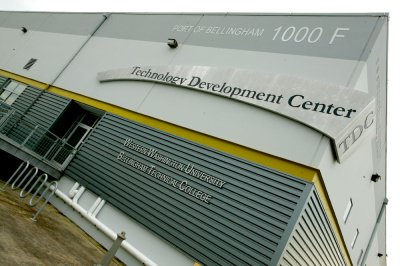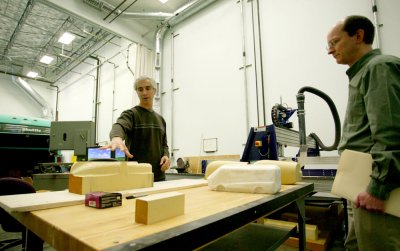WWU awarded $730,000 federal grant for design of hybrid bus
Collaborative project part of port’s Technology Development Center
The Federal Transit Administration recently awarded Western Washington University a $730,000 grant to design a lightweight hybrid bus for transit applications. The project is under way at the Technology Development Center, a Port of Bellingham facility leased by WWU and Bellingham Technical College.
Partners with WWU in the project include Transition Composites, Janicki Industries, Kitsap Transit, Whatcom Transportation Authority, the Port and Airtech.
“Western is committed to strong private and public partnerships, as demonstrated by this innovative hybrid bus project, which are fostering research on and development of new technologies,” said WWU President Bruce Shepard.
The initial design for the bus project will target a 24-foot, 15- passenger, low-floor, paratransit shuttle bus with the primary goals of reducing fuel consumption levels and fleet operating costs, as well as improving driver control and passenger ergonomics. This will be accomplished through the use of high strength-to-weight ratio, sustainable materials for chassis, body and interior components, aerodynamic optimization of the body, and the use of non-petroleum based fuel options for the internal combustion engine portion of the hybrid powertrain.
“The WWU Hybrid Bus Project is a research and design effort that seeks to create a paradigm-changing shuttle bus design intended for a variety of transportation applications,” said Steven Fleishman, hybrid bus project manager and assistant professor of Engineering Technology at Western.
The plan is to build a proof-of-concept (POC) vehicle, based on the Federal Transit Administration design, which is intended to serve as an initial demonstrator for the primary transit industry partners located in the Pacific Northwest region, and other interested customers, and to allow for production feasibility analysis by potential bus manufacturers. The project is currently tracking a three-year design schedule, and to hopefully build the POC vehicle by the fall of 2013. Market analysis indicates a potential national demand for such a hybrid bus of up to 3,000 vehicles annually. Western’s Vehicle Research Institute assisted in planning and collaboration with project partners.
Technology Development Center
Principal partners at the TDC include Western, BTC and the Port. The TDC brings together research and development (through WWU) in partnership with the private sector and practical work-force training for the new technologies (through BTC). In addition to the hybrid bus project, the Technology Development Center also now hosts the Technology Alliance Group and the firm New Market Design Lab.
The Waterfront Innovation Zone, a state-designated Innovation Partnership Zone, was created in 2007 to promote research & development and workforce training in the marine industries and related technologies. With a $1 million state IPZ grant, $477,000 in federal funding and a $247,000 contribution from the Port, the 10,000 square-foot Technology Development Center was opened in September 2009 for use by WWU and BTC.
“This type of project is exactly what the Port had in mind when we first envisioned the Technology Development Center,” said Port Commission President Jim Jorgensen. “Innovation is essential in creating new jobs and opportunities for Whatcom County.”
The TDC features technical work and office spaces for WWU and BTC, as well as shared classroom and conference areas. The TDC work spaces have been designed in a flexible manner, so that a wide range of R&D projects can be accommodated. WWU is targeting use of its 4,587 square-foot space in the TDC for applied research and development projects in partnership with regional technology companies. A unique feature of the WWU workspace is a state-of-the-art particle collection and air circulation system that enables the fabrication of large scale components from advanced composite materials.
Equipment in this space includes a ShopBot CNC router for precise machining of composite tooling materials used in the fabrication of a variety of composites applications. These and other capabilities are being utilized for collaborative R&D projects between WWU and industry partners for a range of high-tech applications. In collaboration with TAG, an out-reach effort is under way to develop partnerships with technology-focused companies throughout Northwest Washington. Projects at the TDC, such as the hybrid bus, are seeking to collaborate with regional organizations to assist with analysis of production feasibility and to foster a creative environment for technology transfer.
“We would very much like to express our appreciation for the collaborations made possible by the Port of Bellingham through the Technology Development Center,” said Arlan Norman, dean of the College of Sciences and Technology at Western.

